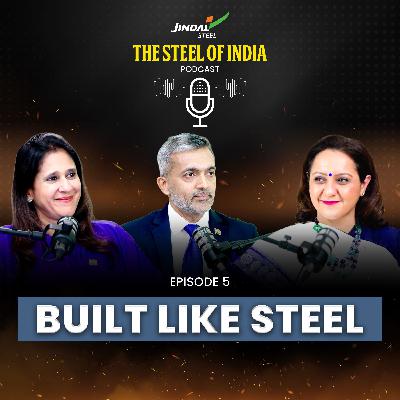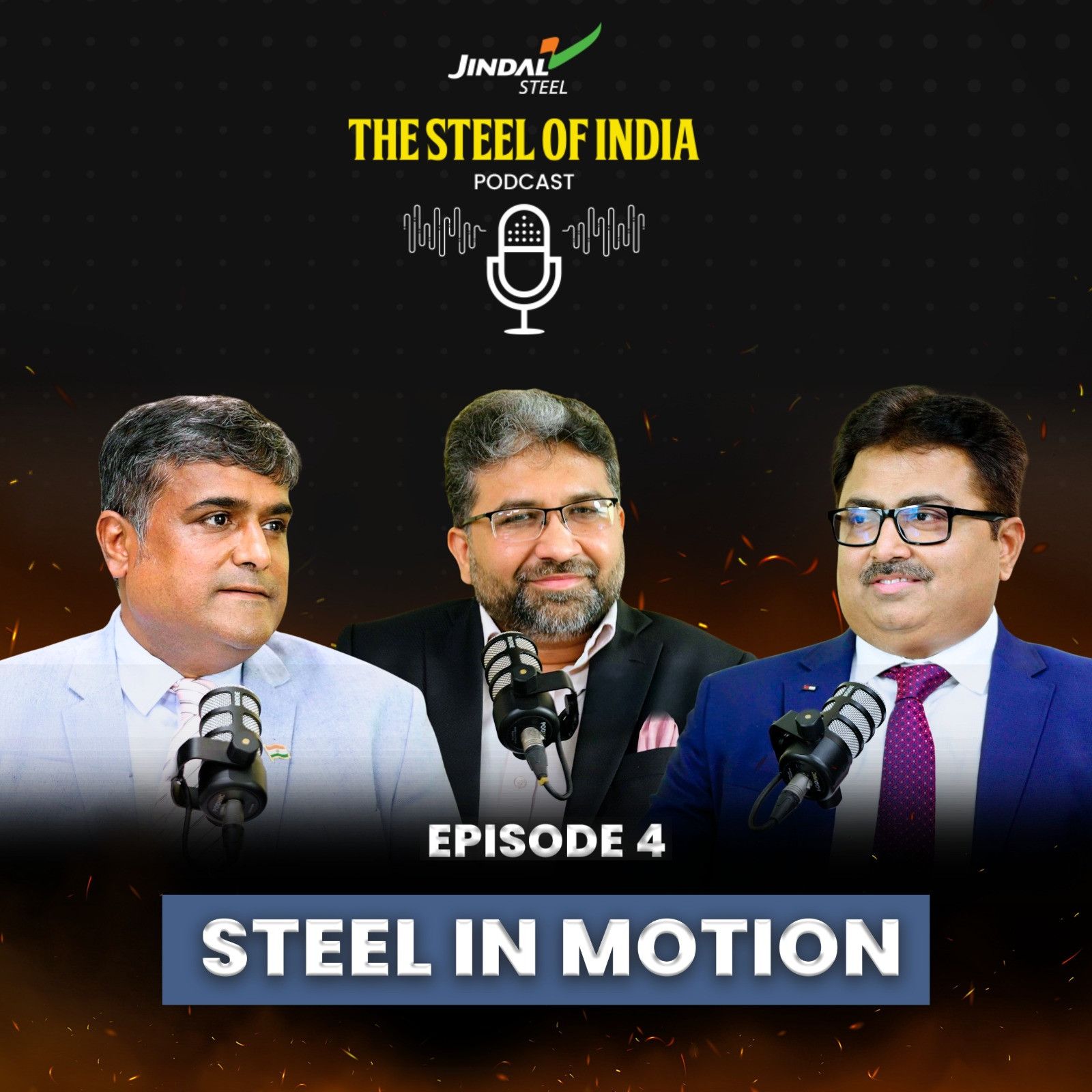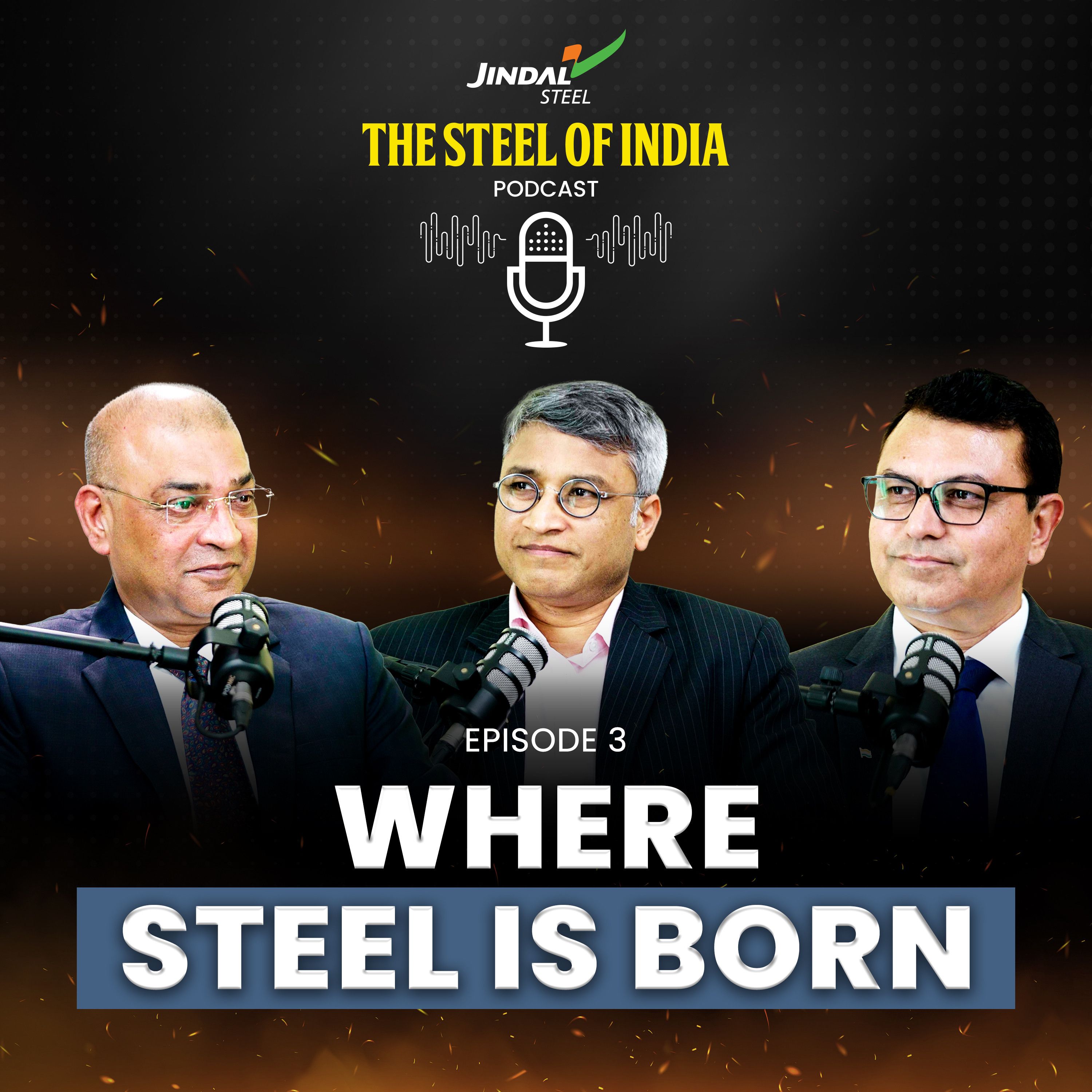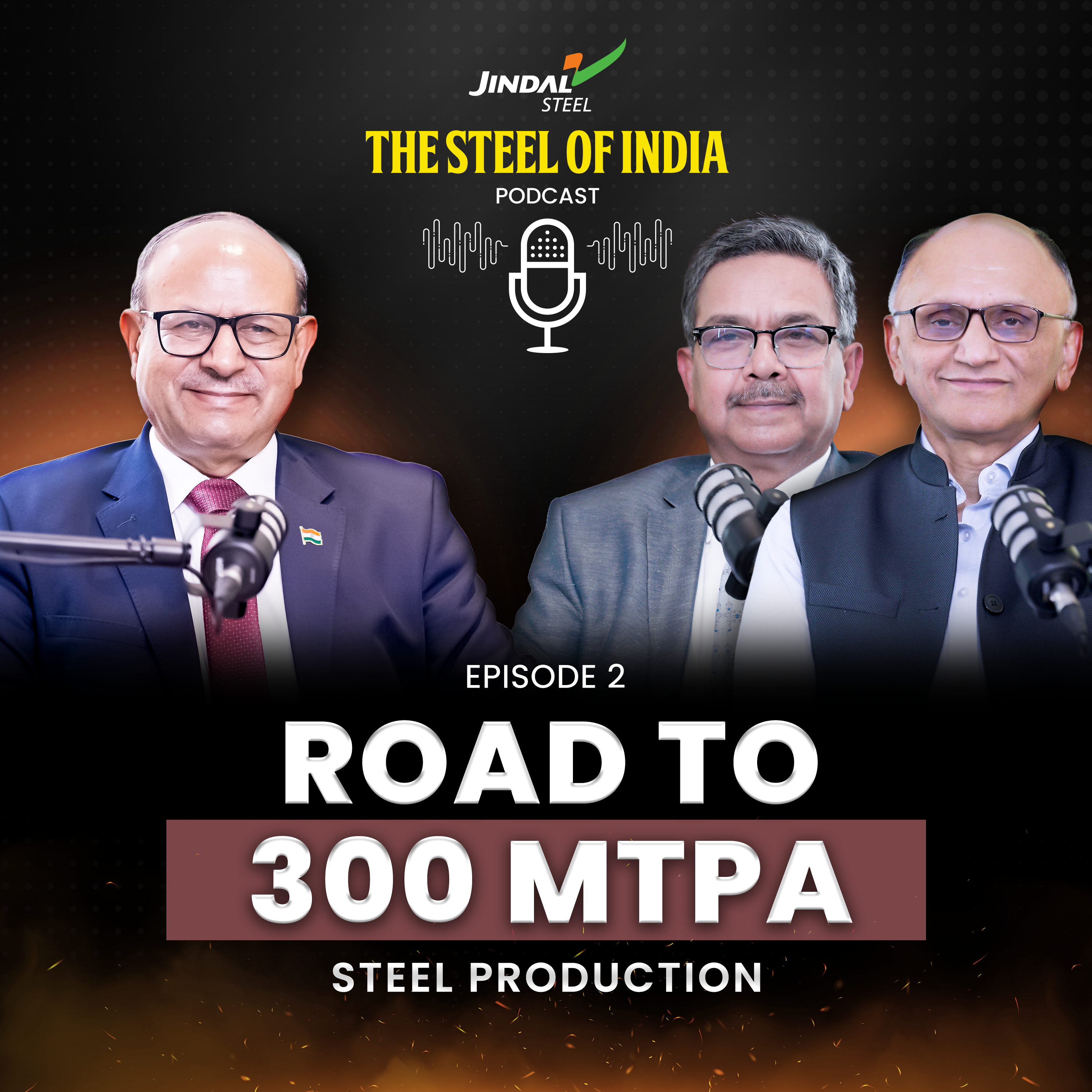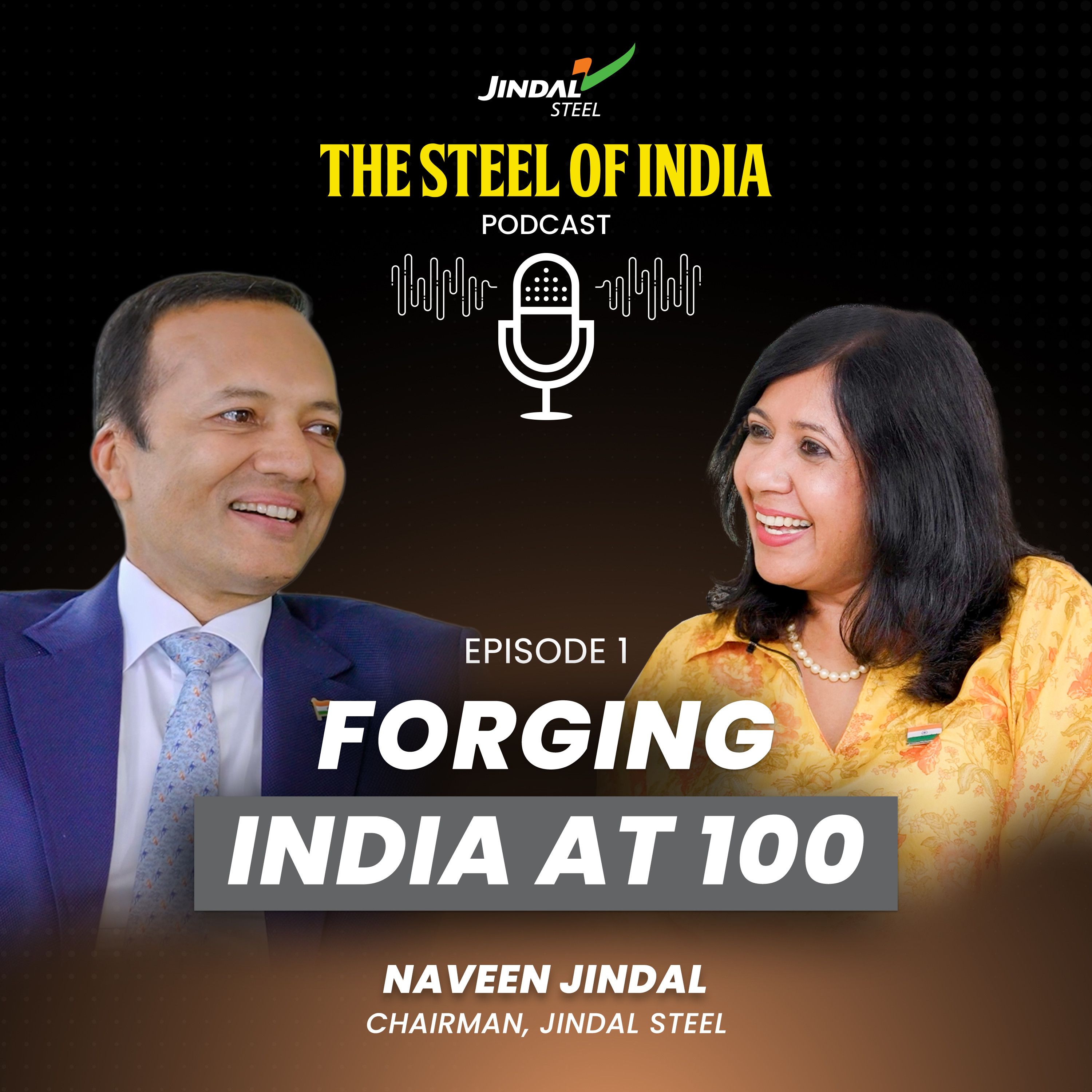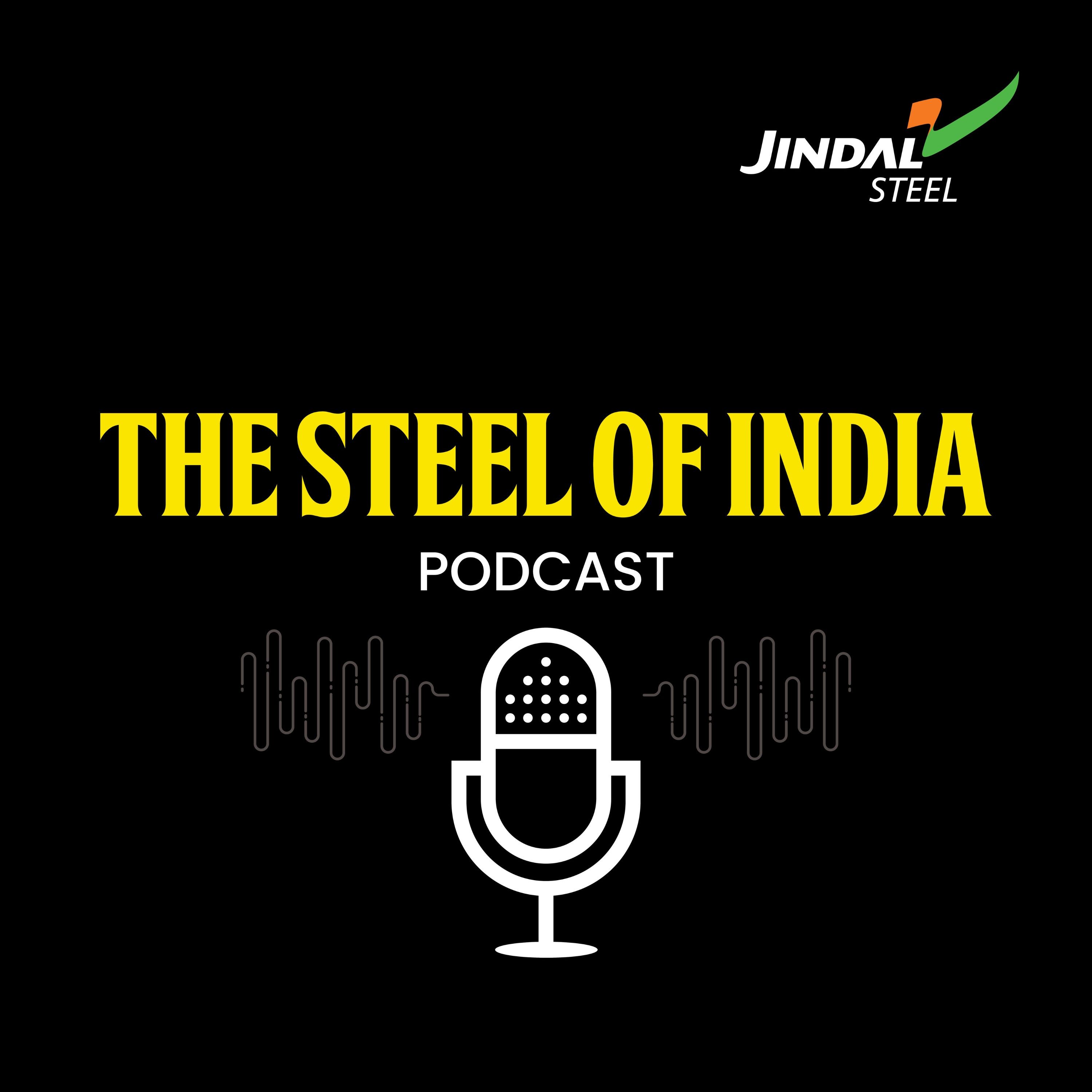Discover The Steel of India Podcast
The Steel of India Podcast

The Steel of India Podcast
Author: Jindal Steel
Subscribed: 0Played: 0Subscribe
Share
© https://www.timbremedia.in/
Description
The Steel of India Podcast brings sharp insight into how steel is powering the next chapter of India's industrial transformation.
Hosted by Jindal Steel, this series features voices from the frontlines across operations, infrastructure, logistics, technology, sustainability, leadership and inclusion. It explores how one sector is shaping scale, systems, and self-reliance.
If you are building for India@100, whether in boardrooms, on the shop floor, in policy or public service, this is your window into what it takes to forge a future-ready nation.
Because the future isn’t imagined. It’s Built.
Jindal Steel is one of India’s foremost integrated steel producers, renowned for its scale, efficiency, and commitment to excellence. Operating on a robust mine-to-metal model, the Company leverages captive resources, advanced manufacturing capabilities, and a global distribution network to deliver high-performance steel solutions. With an investment footprint exceeding USD 12 billion, Jindal Steel runs state-of-the-art facilities in Angul, Raigarh, and Patratu, and maintains strategic operations across India, Africa, and Australia. Its diversified and future-ready product portfolio underpins core sectors such as infrastructure, construction, and manufacturing, powering progress through strength and sustainability.
https://www.jindalsteel.com/
Social Media:
Linkedin: jindal_steel
https://www.linkedin.com/company/jindalsteel-ltd./
X: jindalsteel_
https://x.com/jindalsteel_?s=21
Instagram: jindalsteel_
https://www.instagram.com/jindalsteel_?igsh=MWxseTlrdmJyNzJyMA==
Facebook: jindalsteellimited
https://www.facebook.com/share/16qokH8ACe/?mibextid=wwXIfr
Youtube: jindalsteel_
https://youtube.com/@jindal_steel?si=hIF4TUFdriGGUwR6
6 Episodes
Reverse
Inclusion is no longer a side conversation. It sits at the centre of how industries grow, how leadership is shaped, and how the future of work is being built in India’s core sectors.
This episode of Built Like Steel asks: what does it take to bring women into the heart of one of the world’s most male-dominated industries, steel? Because progress here isn’t just about numbers on a gender dashboard; it’s about questioning how the system was designed, and redesigning it to unlock women’s full participation.
This conversation brings together:
Rajesh Nair, CHRO, Jindal Steel
Shivani Hazari, President and Group Head, Leadership Advisory, Naveen Jindal Group
Ruchee Anand, Senior Director, LinkedIn India
From leadership pipelines and shopfloor skilling to platform data and cultural change, this discussion explores how gender inclusion is being embedded into the operating fabric of industrial India, and why it matters for the journey to India@100.
Disclaimer
The views, opinions, and perspectives expressed by the host’s speakers do not necessarily reflect those of Jindal Steel Limited (formerly Jindal Steel and Power Limited). They are intended for general information and thought leadership purposes only and should not be construed as formal policy statements, operational directives, or binding commitments of Jindal Steel or its affiliates.
Any references to future initiatives, targets, or aspirations are forward-looking in nature and are subject to change based on evolving business priorities, market conditions, regulatory developments, and other external factors. Jindal Steel assumes no obligation to update or revise such statements, and actual outcomes may differ materially.
The views, opinions and perspectives of the guests on this podcast are their own and do not reflect those of the host or Jindal Steel. Listeners and viewers are encouraged to conduct their own due diligence and seek appropriate professional advice before relying on or applying any concepts, ideas, or suggestions discussed in this episode. Any action taken or inaction based on the content is at the listener’s own risk.
While every effort has been made to ensure the accuracy and currency of the information shared, Jindal Steel makes no warranties or representations as to its completeness, reliability, or suitability for any purpose, and assumes no responsibility for errors or omissions. Jindal Steel accepts no responsibility or liability for any direct, indirect, incidental, consequential, special, or other damages that may arise from the use of, reference to, inability to use, or reliance on, the information presented in this podcast. The content is not intended to create rumours, offend any religion, community, or individual, or disrespect any living or deceased person.
All audio, video, textual, and graphical content in this episode, as well as the Steel of India podcast series, remains the exclusive intellectual property of Jindal Steel. No part of this content may be recorded, reproduced, distributed, or used in any form without the prior written consent of the company.
By accessing or listening to this episode, you acknowledge, undertake and agree to the terms of this disclaimer.
Anirban Basu, President and Head of Supply Chain & Logistics at Jindal Steel, shares how future-ready logistics - integrating rail, road, captive infrastructure, and digital tracking - enable production, sales, and growth.
Adhendru Jain, VP of Rail and Inland Terminals at DP World Subcontinent, highlights the transformation of India’s multimodal freight ecosystem through policy initiatives like PM Gati Shakti and Dedicated Freight Corridors, improving efficiency and reducing costs.
Anand Mimani, CEO of Greenline, discusses the imperative of decarbonising steel logistics using cleaner fuels and digital tools. Together, they outline how innovation, collaboration, and sustainability are reshaping supply chains to build India’s future-ready steel logistics backbone.
Disclaimer
The views, opinions, and perspectives expressed by the host’s speakers do not necessarily reflect those of Jindal Steel Limited (formerly Jindal Steel and Power Limited). They are intended for general information and thought leadership purposes only and should not be construed as formal policy statements, operational directives, or binding commitments of Jindal Steel or its affiliates.
Any references to future initiatives, targets, or aspirations are forward-looking in nature and are subject to change based on evolving business priorities, market conditions, regulatory developments, and other external factors. Jindal Steel assumes no obligation to update or revise such statements, and actual outcomes may differ materially.
The views, opinions and perspectives of the guests on this podcast are their own and do not reflect those of the host or Jindal Steel. Listeners and viewers are encouraged to conduct their own due diligence and seek appropriate professional advice before relying on or applying any concepts, ideas, or suggestions discussed in this episode. Any action taken or inaction based on the content is at the listener’s own risk.
While every effort has been made to ensure the accuracy and currency of the information shared, Jindal Steel makes no warranties or representations as to its completeness, reliability, or suitability for any purpose, and assumes no responsibility for errors or omissions. Jindal Steel accepts no responsibility or liability for any direct, indirect, incidental, consequential, special, or other damages that may arise from the use of, reference to, inability to use, or reliance on, the information presented in this podcast. The content is not intended to create rumours, offend any religion, community, or individual, or disrespect any living or deceased person.
All audio, video, textual, and graphical content in this episode, as well as the Steel of India podcast series, remains the exclusive intellectual property of Jindal Steel. No part of this content may be recorded, reproduced, distributed, or used in any form without the prior written consent of the company.
By accessing or listening to this episode, you acknowledge, undertake and agree to the terms of this disclaimer.
Steel is more than a product; it is the backbone of progress. Yet steel is not only forged in furnaces, it is shaped by discipline, culture, and vision.
Episode 3 of The Steel of India Podcast: Where Steel is Born takes listeners inside two of Jindal Steel’s defining plants. At Angul, expansion, green ambition, and digital transformation set the pace for the future. At Raigarh, a flagship built on consistency, institutional maturity, and legacy, scale meets precision and innovation drives excellence.
Joining the conversation are Pankaj Malhan (Executive Director, Jindal Steel, Angul), Sabyasachi Bandyopadhyay (Executive Director, Jindal Steel, Raigarh), and Rajat Gupta (Senior Partner, McKinsey & Company). Together, they unpack how great plants are built: through technology, people-centric systems, leadership discipline, and the relentless pursuit of excellence.
From advanced innovation and workforce resilience to global best practices and sustainability, this episode offers more than insight into operations. Where Steel is Born is both a masterclass in operational excellence and a story of how culture powers the future of an industry.
Disclaimer
The views, opinions, and perspectives expressed by the host’s speakers do not necessarily reflect those of Jindal Steel Limited (formerly Jindal Steel and Power Limited). They are intended for general information and thought leadership purposes only and should not be construed as formal policy statements, operational directives, or binding commitments of Jindal Steel or its affiliates.
Any references to future initiatives, targets, or aspirations are forward-looking in nature and are subject to change based on evolving business priorities, market conditions, regulatory developments, and other external factors. Jindal Steel assumes no obligation to update or revise such statements, and actual outcomes may differ materially.
The views, opinions and perspectives of the guests on this podcast are their own and do not reflect those of the host or Jindal Steel. Listeners and viewers are encouraged to conduct their own due diligence and seek appropriate professional advice before relying on or applying any concepts, ideas, or suggestions discussed in this episode. Any action taken or inaction based on the content is at the listener’s own risk.
While every effort has been made to ensure the accuracy and currency of the information shared, Jindal Steel makes no warranties or representations as to its completeness, reliability, or suitability for any purpose, and assumes no responsibility for errors or omissions. Jindal Steel accepts no responsibility or liability for any direct, indirect, incidental, consequential, special, or other damages that may arise from the use of, reference to, inability to use, or reliance on, the information presented in this podcast. The content is not intended to create rumours, offend any religion, community, or individual, or disrespect any living or deceased person.
All audio, video, textual, and graphical content in this episode, as well as the Steel of India podcast series, remains the exclusive intellectual property of Jindal Steel. No part of this content may be recorded, reproduced, distributed, or used in any form without the prior written consent of the company.
By accessing or listening to this episode, you acknowledge, undertake and agree to the terms of this disclaimer.
India's steel sector is on the cusp of a historic transformation, aiming to reach 300 million tonnes of production per annum by 2030. But doubling capacity raises big questions: How do we grow responsibly? How do we stay globally competitive while meeting domestic demand? And how do we embed sustainability into every stage of growth?
In this episode of The Steel of India Podcast, three industry leaders bring their unique perspectives to the table:
V.R. Sharma, Vice Chairman, Naveen Jindal Group
Sanjay Singh, Advisor & Director, Strategy & External Affairs, Jindal Steel
Alok Sahay, Secretary General, Indian Steel Association
From infrastructure and defence to exports, energy transition, and national strategy, this conversation goes beyond numbers. It unpacks what it will take to scale smartly, sustainably, and in step with India's journey toward Viksit Bharat.
In the inaugural episode of The Steel of India Podcast, Naveen Jindal, Chairman of Jindal Steel, three-term Member of Parliament, philanthropist and accomplished sportsperson, shares his vision for India as it approaches its 100th year of independence in 2047.
He reflects on the role of steel in building a self-reliant India, highlights Jindal Steel’s contribution to nation-building, and offers leadership lessons shaped by his experience across business, public life and sport. This conversation also provides rare personal insight into the values that continue to define his journey and belief in purposeful progress.
The future of India isn’t imagined. It’s built in steel.
From strategy to scale, this is the voice of India’s industrial rise.
If you're building for India@100 in boardrooms, on the shop floor, or in public service this is where steel meets strategy.
The Steel of India Podcast by Jindal Steel.
Streaming soon.


